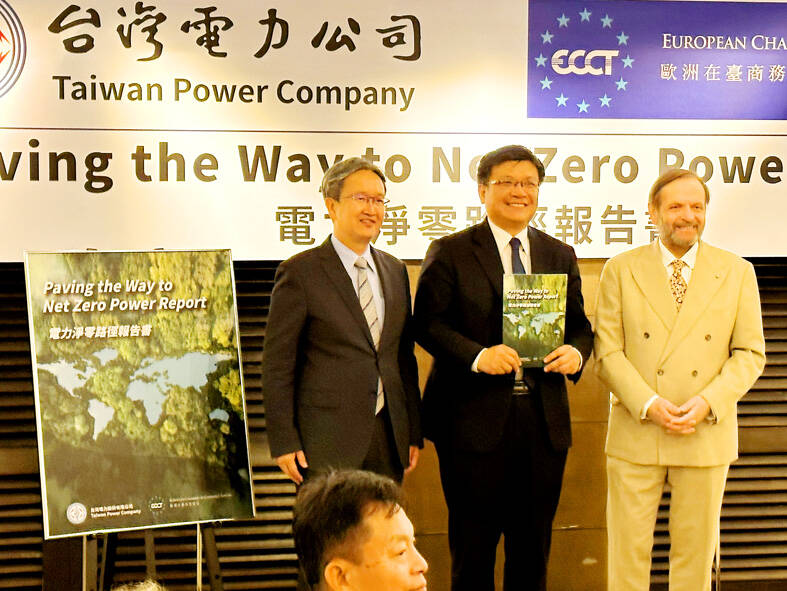The European Chamber of Commerce Taiwan (ECCT) and Taiwan Power Co (Taipower, 台電) yesterday jointly released a report to help Taiwan achieve net zero carbon emissions by 2050.
The report offers proposals and showcases innovative solutions in the pursuit of net zero power given that governments and companies in Europe and Taiwan share a common goal, it said.
The report highlights innovative renewable energy and circular economy solutions divided into four main sections covering energy policy, the supply side, electrical grid and the demand side.

Photo: CNA
Taiwan boasts some of the world’s best conditions for wind and solar energy, but the key missing ingredient to a successful energy transition is an enabling environment, the report said.
The installation of renewable energy capacity in Taiwan has fallen behind the government’s targets mainly due to local content requirements, regulatory red tape and difficulties in financing, it said.
The chamber recommends revising localization rules to encourage local supply chain competitiveness and enhance coordination of policy and implementation between government agencies at the central and local levels to expedite the development of all viable types of renewable energy.
The effort should start with a radical streamlining of the approval process, including establishing green zones for renewable development, simplified repowering rules to replace outdated turbines, and comprehensive planning for port and grid infrastructure to support future projects, it said.
The ECCT also suggests hastening the transition to electric mobility by removing regulatory bottlenecks that are slowing down the building of charging infrastructure and by offering financial incentives to consumers to switch to electric vehicles.
The report also addresses topics such as hydrogen, electric vehicles, energy storage, power grid upgrades and risk management, solar power, wind turbine blade recycling and floating offshore wind energy.
Developers will seek projects that offer the least risk and best chance of making a profit, ECCT said, adding that if developers can find better projects elsewhere, they might choose them over projects in Taiwan.
For example, sourcing components from Taiwan is more expensive than in other countries, it said earlier.
There is a limited number of suppliers for certain components, leading not only to higher costs, but also concerns about capacity constraints and overdependence on a few or sometimes only a single supplier of certain components, ECCT said yesterday.

Taiwan Semiconductor Manufacturing Co (TSMC, 台積電) last week recorded an increase in the number of shareholders to the highest in almost eight months, despite its share price falling 3.38 percent from the previous week, Taiwan Stock Exchange data released on Saturday showed. As of Friday, TSMC had 1.88 million shareholders, the most since the week of April 25 and an increase of 31,870 from the previous week, the data showed. The number of shareholders jumped despite a drop of NT$50 (US$1.59), or 3.38 percent, in TSMC’s share price from a week earlier to NT$1,430, as investors took profits from their earlier gains

In a high-security Shenzhen laboratory, Chinese scientists have built what Washington has spent years trying to prevent: a prototype of a machine capable of producing the cutting-edge semiconductor chips that power artificial intelligence (AI), smartphones and weapons central to Western military dominance, Reuters has learned. Completed early this year and undergoing testing, the prototype fills nearly an entire factory floor. It was built by a team of former engineers from Dutch semiconductor giant ASML who reverse-engineered the company’s extreme ultraviolet lithography (EUV) machines, according to two people with knowledge of the project. EUV machines sit at the heart of a technological Cold

AI TALENT: No financial details were released about the deal, in which top Groq executives, including its CEO, would join Nvidia to help advance the technology Nvidia Corp has agreed to a licensing deal with artificial intelligence (AI) start-up Groq, furthering its investments in companies connected to the AI boom and gaining the right to add a new type of technology to its products. The world’s largest publicly traded company has paid for the right to use Groq’s technology and is to integrate its chip design into future products. Some of the start-up’s executives are leaving to join Nvidia to help with that effort, the companies said. Groq would continue as an independent company with a new chief executive, it said on Wednesday in a post on its Web

CHINA RIVAL: The chips are positioned to compete with Nvidia’s Hopper and Blackwell products and would enable clusters connecting more than 100,000 chips Moore Threads Technology Co (摩爾線程) introduced a new generation of chips aimed at reducing artificial intelligence (AI) developers’ dependence on Nvidia Corp’s hardware, just weeks after pulling off one of the most successful Chinese initial public offerings (IPOs) in years. “These products will significantly enhance world-class computing speed and capabilities that all developers aspire to,” Moore Threads CEO Zhang Jianzhong (張建中), a former Nvidia executive, said on Saturday at a company event in Beijing. “We hope they can meet the needs of more developers in China so that you no longer need to wait for advanced foreign products.” Chinese chipmakers are in